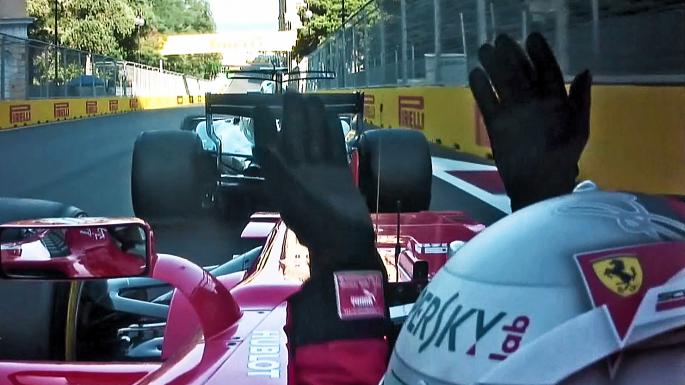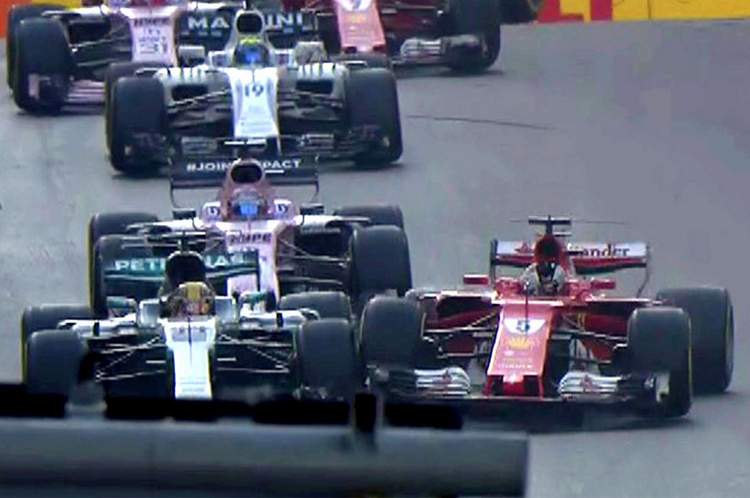Time to let go over Vettel’s Hamilton Baku road rage | NR F1 Podcast

By Callum Springall
A few years ago, it was races like the Azerbaijan Grand Prix that made me feel sorry for those that had to write about them afterwards. So, bear with me!
Straight off the bat, we’ll start with Red Bull – and I didn’t think I’d be saying that this season! It was Daniel Ricciardo who navigated his way through the chaos to take a win drawn from consistency, the ability to stay out of trouble and a very heavy left foot.
After needing to stop to remove debris from one of his brake ducts, the race appeared lost for the Australian. A fortuitous few safety cars and a red flag put him back in the mix – and handily it was fate that put him in a position to claim his fifth grand prix victory, after Sebastian Vettel gained a 10 second stop-go penalty (more on that later) and Lewis Hamilton’s race went from rather good to terrible, due to his headrest working loose after the red flag.
That alone required a 9.3 second pit stop, demoting him to ninth behind his team-mate and later, even title rival Vettel.
I suppose that leads into the incident between the championship contenders that provoked such controversy; essentially it was a case of Vettel trying to hide his guilt and deny full responsibility by blaming Hamilton for ‘brake-testing’ the Ferrari – while post-race, his nemesis was seemingly non-plussed.
If only there were seriously a case for an actual debate. The simple fact is Hamilton didn’t brake coming out of turn 15, as the onboards show – although he did brake on the apex of turn 15, which isn’t necessarily the correct thing to do since one is not allowed to erratically speed up and slow down during a restart.
This is where the term ‘spirit of the regulations’ enters the fray. The hard and fast rule is as mentioned: the lead driver cannot erratically change their speed, so there’s no guilt on Hamilton’s part there since his speed was fairly constant and only reduced slightly because he was backing up the pack, as was his right.
The opposing argument is that Hamilton wanted to go to early. The first restart showed that prime position to restart was turn 16, but he caught the safety car. The safer thing to do was not allow the pack to close up so rapidly, bolt after turn 16 and take the pain. However, this argument is unequivocally bull**** – pardon my Azeri – because nobody wins three world championships through such compromise.
It’s also partly down to the final sector being too short, which means the safety car breaks away too late and the lead car arguably has to go ‘too slow’ to maximise their advantage for the restart.
The rest of the blame lies firmly at the door of a winner in Vettel, who got over-exuberant and lost his composure in trying to not allow Hamilton the breathing space he had after the previous restart.
While you don’t win four titles through such compromise, it is undeniable that Vettel pushed the boundaries too far. But he knew the cost of getting the restart wrong on a circuit of the nature of Baku, since Sergio Perez almost got the jump on him after the first restart. Therefore, it was a racing incident only up until that point.

It wasn’t particularly big or clever from Sebastian Vettel.
Vettel’s penalty was completely down to his outward show of displeasure towards his title rival . Rather than settling for a solid second on a track not suited to his car, with an ageing and a potentially illegal engine design being highlighted pre-race, the German turned into the side of the Mercedes and that gained him a wholly justified stop-go penalty
Shades of Prost, there are not. Shades of Maldonado, certainly!
Some may cry foul – not at Vettel, but the FIA. There have been accusations the 29-year-old ought to face a ban. However the key to arbitration, be it among the judiciary or sporting referees, is consistency. The only comparable incident to this is – rather embarrassingly for Vettel – Pastor Maldonado’s identical move during the 2012 Monaco Grand Prix, for which Maldonado was given a 10-place grid penalty.
So they were both overtaken by half of the grid, which seems fair enough and quite honestly, I won’t debate this any further because I can’t stand talking about a Brit fighting a German any longer.
SUBSCRIBE: Listen to The NR F1 Podcast on your chosen podcast player
So, 730 words in and I haven’t even mentioned the star of the race yet.
In my pre-race article I highlighted the good work done by Lance Stroll to turn around a consistent 0.7s deficit to Felipe Massa into a fairly cushy advantage by the end of Friday practice; it would seem that some time testing a 2014 Williams in Austin gave Stroll more experience of set up, while some coaching from Rob Wilson – a mentor to many drivers on the F1 grid – would appear to have ironed out some of the bumps in Lance’s driving, if not those on the Baku street circuit.
We’ll see where the rookie goes from here but some debut points in Canada (or Canadia!) visibly lifted his spirits, while a Baku podium gives him a platform to challenge – and possibly beat – his team-mate between now and November.
 Elsewhere, Valtteri Bottas channeled the spirit of Porsche and came from nowhere to achieve a remarkable second place having been a lap down after a first-lap puncture, although successive safety cars benefited him in the same way it did Ricciardo – leaving the dirty work to the Finn out on track to make good of his luck.
Elsewhere, Valtteri Bottas channeled the spirit of Porsche and came from nowhere to achieve a remarkable second place having been a lap down after a first-lap puncture, although successive safety cars benefited him in the same way it did Ricciardo – leaving the dirty work to the Finn out on track to make good of his luck.
In Williams’ battle with Force India, the latter got it all wrong as Esteban Ocon tried to pass Sergio Perez on the inside and didn’t leave the space for Perez to escape without incident – wrecking their races when a possible double podium may have even been in order.
Hindsight is both a best friend and worst enemy, but Ocon still managed to salvage some points for his team – although one may quip it was harder for him not to. It’s pride that can hurt most, going into a crucial part of the season for Force India if they are going to open up a comfortable gap to their nearest challengers.
There was another points finish for Sauber, whose drivers certainly found out that rubbing is racing, while McLaren were finally in the top 10 – and even on a power-dependent track. Hurrah!
Mind you, the sleeping giants still trail the aforementioned, Swiss penny-pinchers. Ah.
Never mind, because once again F1 in 2017 proved it is no boring slog – but in Daniil Kvyat’s words: “a stupid f****** circus.” Pardon my Azeri!
♦ Callum Springall is a blogger with the NRF1. You can follow Callum on Twitter @callumspring18

